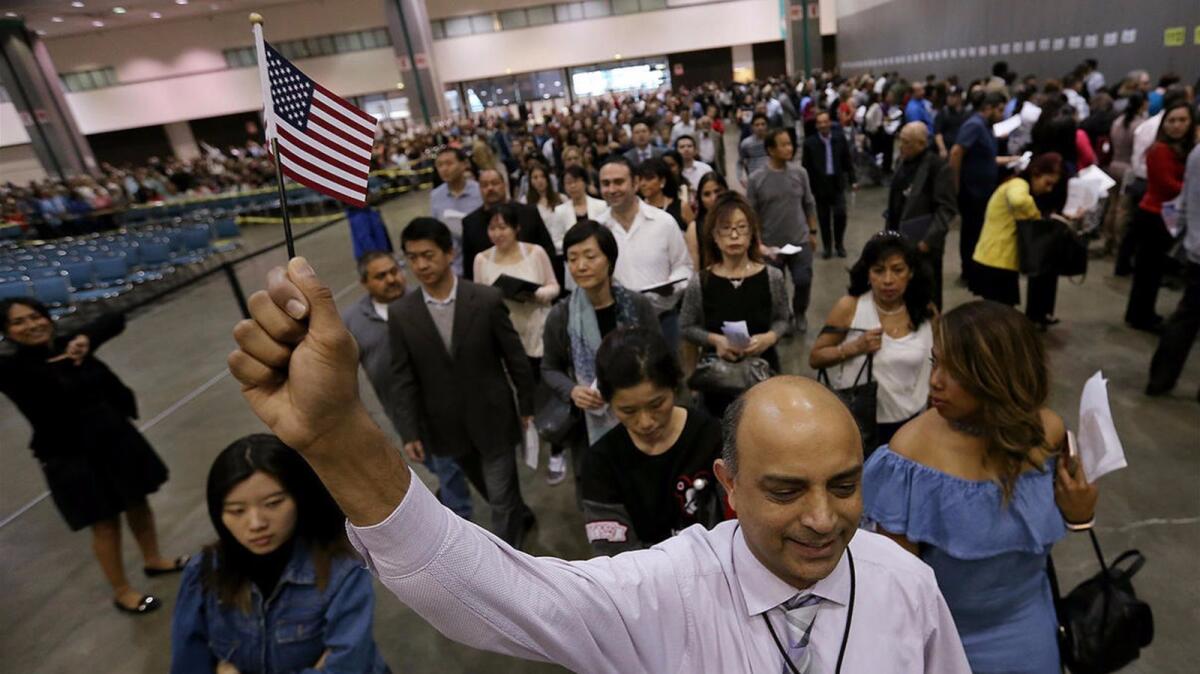Op-Ed: I became a U.S. citizen last week. Then I had to figure out how to vote by Super Tuesday

- Share via
A week before the California primary, I was one of about 10,000 people sworn in as new American citizens at the Los Angeles Convention Center. Like many of those alongside me, I became an American out of fear.
The Trump administration’s drastic actions against immigrants — such as separating asylum seekers from their children and planning to deny green cards to immigrants who might claim public benefits — made my life as a non-citizen here feel rocky and uncertain, a dubious privilege that could vanish at any time.
A custody battle with my son’s American-born father prevented me from leaving the United States for several years, cutting me off from my work as a screenwriter and journalist, which is based in my home country of the United Kingdom. So I became one of those immigrants who needed to lean on food stamps, Medi-Cal and other benefits.
The woman officiating our citizenship ceremony told us we probably wouldn’t be able to vote in the California primary on Tuesday, and we would have to wait to until November to make our voices heard. I felt cheated. After 15 years of living in the U.S. and canvassing for various causes and candidates — even though I couldn’t vote — surely seven days of citizenship qualified me for Super Tuesday?
I’m not quite sure who our officiant was. It was hard to pay close attention, since I was becoming a citizen while wrangling my bored 6-year-old son, a birthright American citizen, who had discovered another birthright American citizen his age. Both had been dragged to the ceremony by parents vainly hoping to imbue some sense of national pride into kids more concerned with “Minecraft” and the “Fancy Nancy” books.
The only time the kids paid rapt attention was when POTUS appeared on a giant video screen, causing my son to loudly yell, “It’s DONALD TRUMP! He’s a bad man.” His new friend responded, “Yeah because he LIED.” The ceremony lost a degree of pomp and importance it would have had if we had just left the children in school. The video of Lee Greenwood’s “God Bless the U.S.A.,” was no help. Depicting a blue-skied multicultural idyll of happy, clean, slim, attractive Americans serving their country and holding hands, it strongly reminded me of Chinese communist propaganda.
It felt like an inauspicious start to my rebirth as an American.
After the ceremony, however, I felt a renewed sense of purpose and validation after some quick Googling revealed the voting information we had received during our oath ceremony was dead wrong.
A Los Angeles County website devoted to voting said on its “New Citizens” page: “People who become citizens after the close of registration may register and vote at the Registrar-Recorder/County Clerk anytime up until the close of polls on Election Day.”
We newly minted citizens could vote in the primary. But then another hurdle: How do we … do this?
The United States has, arguably, the most complicated and arcane voting system in the world, but little attention is given to actually explaining the system in clear and precise language to new voters. Not only is the system itself complex and demanding, the amount of knowledge required to make an informed choice on the ballot is simply overwhelming.
Like many of my fellow new citizens, my home country’s voting system is pretty simple. I was used to ticking one box on a ballot. Making one choice.
The U.S., in contrast, throws voters a curveball with a complex ballot that involves a veritable who’s who of office-holding. We are expected to vote for, among others, judges, congresspeople, city council and school board members — and a potential president of the United States. Just to confuse things, a man who legally changed his first name to “Judge” is seeking to be a Superior Court judge in L.A. County.
How is any citizen supposed to navigate this madness? The battle of the ballot and a lack of detailed information could deter many from making their voices heard.
When taking the citizenship oath so close to an election, new citizens must scramble to register. But recent changes in California allow new citizens to walk into any voting center in the state and cast their ballots in person, albeit on a provisional ballot. But before we do this, we must also become internet sleuths, researching a multitude of candidates based on their past performance, their reputations, their affiliations, their intentions.
The onus is on us, as new voters and Americans, to muddle through as best we can. New citizens can and should Google the living daylights out of every issue and candidate, and read everything they can. And don’t be afraid to ask for advice, which Americans love to supply.
I may have become a citizen because I felt I had no choice. But I also became a citizen because I’m determined to make this democracy work for my family — each of us now an American.
Ruth Fowler, originally from Wales, is a screenwriter and journalist in Los Angeles.










